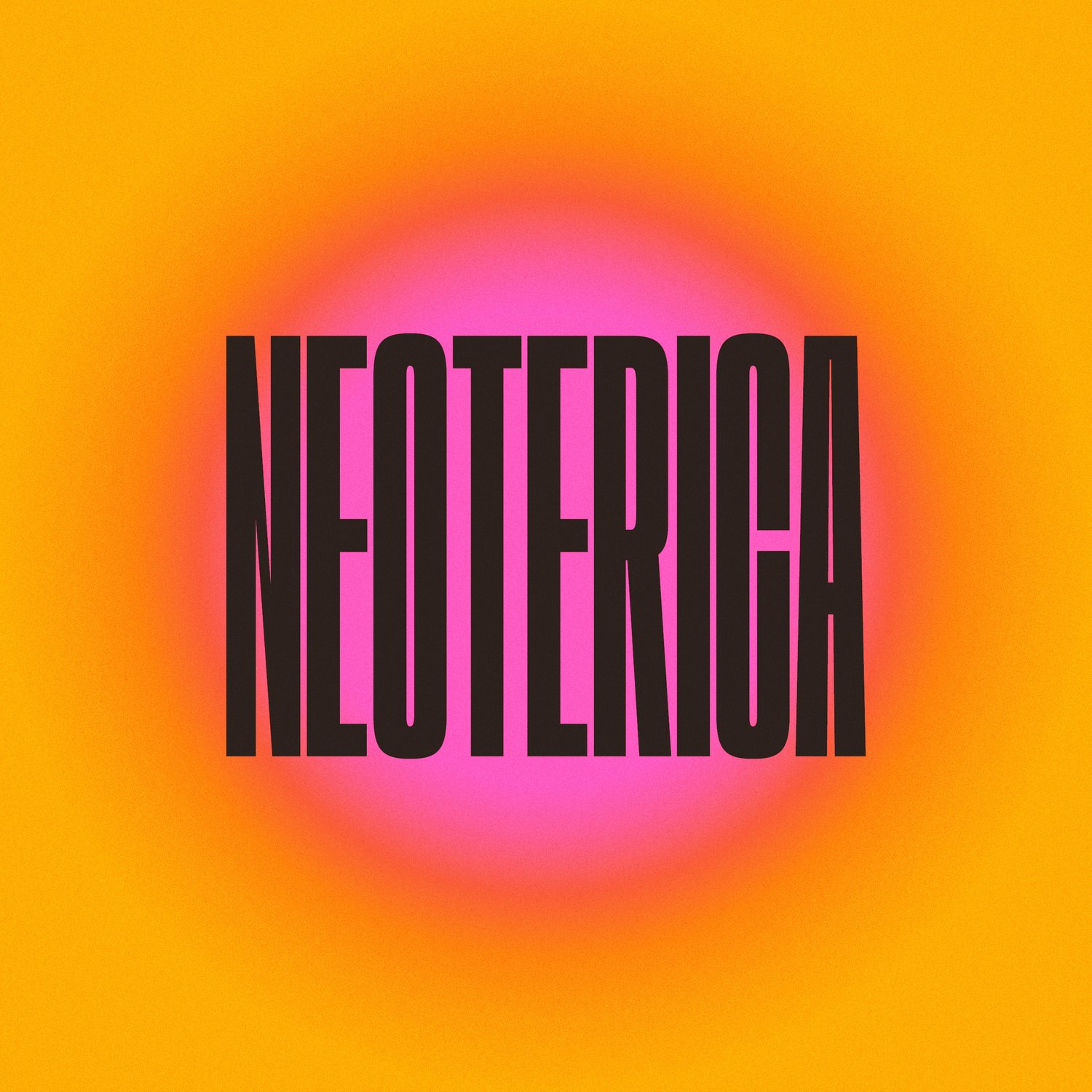Sasha Grbich
Sasha Grbich writes about Makeda Duong in Neoterica 2024.
The Secrets of the Soulpreneurs
It begins with the arrival of a warm knitted thing in the shape of a diamond, with a void at its centre. Unfurled on my kitchen table it is as wide as my open arms. It seems devotional and portal-like, or as though about to host a vivid birth. It is to be spread across a wall with a winged, sequinned eye at its nave. I could stick my head through it, or wrap it around me as a poncho. Colourful slogans adorn its surface - Are you tired of feeling average, normal, and sane? it asks me.
We sip tea as Makeda Duong reads aloud to me from her work. I am told that beauty and terror will save me from mediocrity, and that I could harness love to become a ‘manifesting generator’ endlessly producing my dreams in the waking world. Such are the teachings of the Bipolar Guru (2024) whose messages are wrought in the resonance Duong observes between the slippery language used by spiritual life coaches, and her own bipolar manic delusions.
The work leads me into cavernous sinkholes of self-help, where my fragile finances and poor health are explained by lack of connection with my inner self. Duong takes me deeper still into the darklands of the soulpreneurs - and tells me to keep my third eye open. As grim as the going gets, I observe the spiritual life coaching phenomenon providing healing-rites that seem important to identity creation and meaning making. Many beliefs contain forms of discontent - perhaps reflecting their ‘new age’ counterculture roots - but the insistence that social ills must be resolved by expensive, quick-fix personal transformation turns any questioning of the status quo into fuel for neoliberalism.
After Makeda leaves, the phrase ‘Capitalism and Schizophrenia’ gets stuck running laps in my head. It is the title given to Deleuze and Guattari’s philosophical tomes better known individually as Anti-Oedipus (1972) and A Thousand Plateaus (1980). I plunge in to find that Anti-Oedipus describes the way that abject fear of lacking things constantly produces capitalism within people1 – or as Sylvia Wynter corrects – within people under the conditions of whiteness and empire.2 I begin to think of Anti-Oedipus as a self-help book for unpicking traces of control internalised through exposure to bad politics. I find their description of people as interdependent multiplicities that flow together to be a peaceful antidote to the hyper-individualism Duong’s work makes visible. I am less comfortable with their instrumentalisation of Schizophrenia, which seems disingenuous next to Duong’s generous reflection on what it is to live with bipolar disorder amidst the madness of our world.
Duong makes clear that she supports and enjoys the benefits of mental health medication. Carefully planned stitches process her experiences into knitting that travels everywhere with her. This is not post-studio art, this is pre-studio art. Its ancestors are the many women through time, leaning over their textile work in moments gleaned from chores. Art historian Hanneke Grootenboer has made a study of still life paintings of such women, reframing their undertakings as pensive rebellion in plain sight, the language of their resistance the stitches that Duong’s hands now carry into new territory.3
1 Deleuze and Guattari, Anti-Oedipus, (Minneapolis: University of Minnesota Press,1983). First printed by Viking in 1972.
2 While Sylvia Wynter does not provide direct critique of this text she details conditions of whiteness in many essays, including Sylvia Wynter, “Sambos and Minstrels”, Social Text, No. 1 (Winter, 1979), p. 149-156.
3 See Hanneke Grootenboer, The Pensive Image: Art as a Form of Thinking, (Chicago: University of Chicago Press, 2021).
Sasha Grbich is a mid-career artist, writer and lecturer who works responsively with places and communities. An avid collector of things, found footage, sounds and stories; she is fascinated by the way art takes part in the politics of everyday life. Sasha approaches artworks as ecologies: unfinished events that perform with audience and in local environments. She recently spent time living and studying in Portugal having received the 2018 Anne & Gordon Samstag International Visual Art Scholarship. Sasha is a regular contributor to Artlink Magazine, amongst other critical review publications, and recently contributed to Waikfield Press's publication on Helen Fuller, 2023. In 2015 she completed postgraduate research at University of South Australia and she is currently undertaking a PhD at Flinders University seeking the stories of those made marginal in the archives of the experimental art movement (1974-1984).

